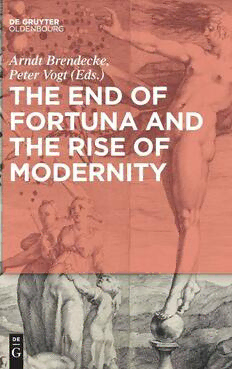Table Of ContentArndtBrendecke,PeterVogt(Eds.)
TheEndofFortunaandtheRiseofModernity
The End of Fortuna and the
Rise of Modernity
Edited by
Arndt Brendecke and Peter Vogt
ISBN978-3-11-045042-2
e-ISBN(PDF)978-3-11-045504-5
e-ISBN(EPUB)978-3-11-045259-4
LibraryofCongressCataloging-in-PublicationData
ACIPcatalogrecordforthisbookhasbeenappliedforattheLibraryofCongress.
BibliografischeInformationderDeutschenNationalbibliothek
TheDeutscheNationalbibliothekliststhispublicationintheDeutscheNationalbibliografie;
detailedbibliographicdataareavailableontheInternetathttp://dnb.dnb.de.
©2017WalterdeGruyterGmbH,Berlin/Boston
Typesetting:bsixinformationexchangeGmbH,Braunschweig
Printingandbinding:CPIbooksGmbH,Leck
♾printedonacidfreepaper
PrintedinGermany
www.degruyter.com
Content
Brendecke/Vogt
Introduction
TheLateFortunaandtheRiseofModernity1
SusanneReichlin
TheRelationshipbetweenRegularityandIrregularityin
MiddleHighGermanPoemsonFortuna15
BurkhardtWolf
Fortuna'sSeaChange
RenaissancePoeticsofContingency47
NicoletteMout
JustusLipsius(1547–1606):FortuneandWar63
Müller/Gruber
FortunaRevalued
OntheGoddess'sSexualisationintheRenaissance82
JoséM.GonzálezGarcía
FortunainSeventeenthCenturySpain
Literature,PoliticsandtheVisualArts108
PeterVogt
TheDeathofFortunaandtheRiseofModernity
ProlegomenatoanyFutureTheoryofModernity125
FranziskaRehlinghaus
FarewelltoFortuna–TurningtowardsFatum
TheTransformationofFateConceptionsintheSeventeenthand
EighteenthCenturies151
KristiinaSavin
FortunainEarlyModernSweden
TheHeydayandDeclineofaCommonplaceConcept175
VI Inhalt
FlorenceButtay
LaFortunevictimedesLumières?
RemarquessurlestransformationsdeFortuneaux
XVIIeetXVIIIesiècles192
ListofIllustrations211
IndexofPersons215
ArndtBrendecke/Peter Vogt
The Late Fortuna and the Rise of Modernity
1 Fortuna’s Transformations
Fortuna,thegoddessofchanceandluck,shouldactuallynolongerhavehada
place in the Christian mediaeval period, at least if Christianity had abided by
the condemnation of Fortuna in late antiquity by the church father Augustine.
AsWalterHaug–inareferencetoMatthew10:29–aptlyputit,Fortunawould
have“noplace[inaworld]inwhichnotasinglesparrowfallstoearthwithout
the will of God.”1 But Fortuna possessed a fascinating ability to transform, al-
lowing her to survive the transition of the ages and live on until the threshold
ofmodernity.2Anancientgoddess,knownasTycheorFortuna,thusbecamea
persistent motive in the Christian mediaeval period.3 This transformation was
possibleonthebasisofStoic-Neoplatonictraditionswhichmaintainedtheirin-
fluencewithinChristianity.TheyseeFortunaandchance(casus)astheexpres-
sion of a hidden order, i.e. based on causes that exist but remain unknown to
us.4 While Boethius, in De consulatione philosophiae (524 CE), was not entirely
able to resolve the fundamental contradiction between the omniscience and
providence of God and the actions of an apparently arbitrary Fortuna, he did
manage to exploit it for Christian didactic purposes. This Boethian Fortuna,
namely, was able to demonstrate to the individual Christian the unpredictable
vicissitudesofworldlyexistence.Shetaught himorhertoplacelittlevalueon
earthly life and to treasure the safe ground of faith. This Christian mediaeval
Fortunaappearedwithincreasingfrequencyfromthetwelfthcenturyonwards:
1 Haug, Walter, “O Fortuna. Eine historisch-semantische Skizze zur Einführung”, in: Walter
HaugandBurghartWachinger(eds.),Fortuna.Tübingen1995,1–22,1.
2 Meyer-Landrut, Ehrengard, Fortuna. Die Göttin des Glücks im Wandel der Zeiten, Munich,
Berlin1997.
3 Frakes,JeroldC.,TheFateofFortuneintheEarlyMiddleAges.TheBoethianTradition,Lei-
den,NewYork,Copenhagen,Cologne1998,29–30.
4 Even in the early work of Augustine, in Contra Academicos (AD 386), the argument can
clearly be found that that which we call Fortuna could be directed by a system of order to
which we have no access (“etenim fortasse quae vulgo fortuna nominatur, occulto quodam
ordineregitur”).Later,inDecivitateDei(AD415)andintheRetractationes(AD426/427),an
explicitcriticismofContraAcademicos,Augustinerejectshisearlierpositionasanillegitimate
obligationtoancientthought.SeeMarkschies,Christoph,“‘Providenceleavesnorealroomto
fortuna’.VomZufallbeiAugustinus”in:HartmutBöhme,WernerRöckeandUlrikeStephan
(eds.):Contingentia.TransformationendesZufalls,Berlin,Boston2016,39–49,43.
https://doi.org/10.1515/9783110455045-001
2 ArndtBrendecke/PeterVogt
asanassistantoftheChristianGod,shenolongerstoodforpurearbitrariness,
butratherforthedecrepitudeofallthatisworldly.Thewheelnowbecameher
primaryattribute: itsrotation demonstrated adrasticchange infortune, which
did,however,followacertainregularpattern.Butthedepictionofkingsbeing
castdownandpeasantsraisedupwasinfactarepresentationofaphenomenon
that was virtuallynon-existentin estates-basedsociety, namelysocialmobility
betweentheestatesandarotationofsocialroles.5Fortuna’sactionscouldthus
leadtoabruptchangeinindividualcases,butwhatseemedunjustinansingle
casewasactuallysubjecttoabalancinglogicoverall.
The Renaissance formed a very different concept of the increasingly popu-
lar Fortuna. She was considered to be fundamentally unpredictable, but also
potentially open to influence, either through fortitudo or prudentia, thus reviv-
ing and renewing ancient ideas on the subject. The former was also based on
authorssuchasTerence(“fortisfortunaadiuvat”),butprimarilyonCicerowith
his concept of a vir virtutis,6 while the latter drew its legitimacy from Seneca
and Stoicism. Cicero had argued that Fortuna could be set on a favourable
course through fortitudo. The Stoic tradition, in contrast, emphasised that one
should make oneself independent of her whims through prudentia and the
calmnessofone’sownsoul(tranquillitasanimi).Oneshouldallowoneselftobe
corrupted neither by misfortune nor by unexpected luck, which Fortuna also
constantlypromisedtodeliver.Theonetraditionthusaimsforaself-awareness
abletowinthebenevolenceofFortuna,climaxinginthetoposofvirtùvincefor-
tuna.Theother,Stoictraditionaimsforaninnercountenancewhichminimises
the effect of worldly vicissitudes. Both have been well researched, as the Re-
naissance Fortuna has attracted generations of historians. They have followed
thetransformationofthegoddessintoatopos,therebyalwaysremainingaware
ofherroleasahighlysignificantmarkeroftheepochaltransitionofEuropean
formsofthought.7ForwithFortuna’shelp,anewrelationshipoftheindividual
tohistorycanbemarkedout,thusenablingustofollowthetwogreatepochal
trends of the early modern period, namely the development of a new under-
5 Haug,Walter,“OFortuna”,7;Müller,Jan-Dirk,“DieFortunadesFortunatus.ZurAuflösung
mittelalterlicherSinndeutungdesSinnlosen”,in:WalterHaugandBurghartWachinger(eds.),
Fortuna,216–238,218.
6 Cicero,TusculanaeDisputationes,lib.II,cap.18,par.43;Vogt,Peter,“Virtùvincefortuna.
Aufstieg,WandelundspäteBlüteeinesfrühneuzeitlichenTopos”,in:HartmutBöhme,Werner
RöckeandUlrikeStephan(eds.),Contingentia,81–82.
7 Haug,Walter,“OFortuna”,21;Politis,Cordula,TheIndividualizationofFortuneintheSix-
teenth-CenturyNovelsofJörgWickram.TheBeginningsoftheModernNarrativeinGermanLit-
erature,Lewiston,N.Y.2007,1.
TheLateFortunaandtheRiseofModernity 3
standingofhistoricaltime(andopenfuture)andtheconstitutionofaself-con-
sciouslyactingsubject.
The history of Fortuna shows that this transformation occurred neither
quicklynorinlinearfashion.Asinglemomentcannotbedeterminedinwhich,
asJacobBurckhardtillustrativelyputit,theveilwasliftedunderwhichtheme-
diaevalperiodhadlain“dreamingorhalf-awake”.8Infact,theoppositeismore
the case, namely that there was a long period of overlap between late mediae-
val-Christian and proto-modern views of mankind and history. Fortuna was
partytoneitheronenortheother.Infact,shewasquitetheopposite,contribu-
ting to the practical mediation between the fundamental contradictions which
persisted for an extended period of time. For pointing out these contradictions
meantadmittingthatthesuccessandfailure,theluckandmisfortuneofaper-
son could be ascribed neither entirely to providence nor entirely to his or her
ownachievementsandvirtues,andaboveallmeantemphasisingthatitwasin-
determinableinaverysignificantwaywhichofthesefactorswasmostdecisive.
ThemotifofFortuna,therefore,continuedtoappearduringtheRenaissanceas
a quasi-divine power, while also representing a deficiency, namely human in-
ability to predict and plan the courses of their lives and courses of action, i.e.
thelackofabilitybothtodisposeoveroneselfandtodecipherthemechanisms
ofhistoryintheirentirety.
The lessons to be learned from this varied and transformed considerably
during theRenaissance. InDante’s Divina Commedia (ca.1307−1321) aswell as
inPetrarca’sDeremediisutriusquefortunae(1366),Fortunainitiallyremaineda
figure who acted mostly within the confines of God’s providence. For the indi-
vidual,thismeantthatitappearedtobeneithervirtuousnorpromisingtorebel
against Fortuna, i.e. to question God’s providence.9 In historical-philosophical
terms, this raised serious questions: if Fortuna’s actions did indeed follow a
(hitherto) hidden plan, then this plan must eventually be able to be deci-
phered.10 Fortuna, however, historically distributed luck whimsically and un-
equally.TheRenaissanceexperienceofaratherincreasingamplitudeinthevi-
8 Jacob Burckhardt, Die Cultur der Renaissance in Italien. Ein Versuch. 2nd Edition, Leipzig
1869,104.
9 ParticularlyPetrarca’sconceptofFortunaissubjecttovaryinginterpretations.Cf.ontheone
handHeitmann,Klaus,FortunaundVirtus.EineStudiezuPetrarcasLebensweisheit,Cologne,
Graz 1958, 84; on the other hand: Keßler, Eckhard, Petrarca und die Geschichte. Geschichts-
schreibung, Rhetorik,Philosophie imÜbergang von Mittelalterzur Neuzeit, Munich 1978, 141–
158.
10 Wootton,David,“FromFortunetoFeedback.ContingencyandtheBirthofModernPolitical
Science”,in:I.ShapiroandS.Bedi(eds.),PoliticalContingency.StudyingtheUnexpected,the
AccidentalandtheUnforeseen,NewYork2007,21–53,22.
4 ArndtBrendecke/PeterVogt
cissitudes of luck and misfortune, rise and fall, poverty and wealth, historical
successandfailure,ledtoaneedfornewmodelsbothofhistoryandofhuman
control over it. Both emerged in places where such vicissitudes could be most
directlyobservedandindeedexperienced,namelyatthecourtsandinthecity
republics of Italy. There, the motif of Fortuna experienced a new blossoming:
strokesoffatebecamealiterarytheme,andeven,toacertainextent,astructur-
alelementofbiographicalnarrative,suchasinBoccaccio’sDecasibusvirorum
illustriumwrittenaround1360.
ButhowshouldonebraceoneselfforthesewhimsofFortuna?Intheworks
of many authors, including Boccaccio, the dominant argument is a moralising
onewhichinsiststhatprideandgreedmustbeavoided,astheyprovokeapun-
ishment which corrects the will to advanceif it is driven by sinful motives. An
actualtransformedrelationshipbetweenvirtusandFortunadidnotappearuntil
the quattrocento: many authors then began to portray Fortuna as a power
whichcouldbecontrolledthroughvirtù,althoughtheextentofthiscontrolre-
mained a matter of contention. Leon Battista Alberti highlighted the fact that
individualsandpeopleswerethearchitectsoftheirownfortune.One’sownvir-
tùwastherebymarkedasadeterminingfactortowhichFortunapotentiallyad-
hered.11 The ancient argument now reappeared that fortune favoured the bold
andstrong.“Audentisfortunaiuvat”,Virgilwrote.12AeneasSilviusPiccolomini
went a step further in his Somnium de fortuna (1444): here, it is the victorious
Alfonso V of Aragon entering Naples who grabs Fortuna by the scruff of the
neckandsubjugatesher.13
Fortuna was now literally being brought down to earth and luck was be-
coming potentially controllable. This subjugation topos had notable gender
connotations,formenwerenowconceptualisingthegoddessasawomen.This
was most clearly formulated by Machiavelli, who famously wrote that Fortuna
is “a woman”. In order to subjugate her, according to Machiavelli, it is neces-
sary“tobeatherandstrikeherdown.Andonealsoseesthatsheletsherselfbe
wonmorebytheimpetuousthanbythosewhoproceedcoldly.Andsoalways,
as a woman, she is the friend of the young, since they are less cautious, more
ferocious,andcommandherwithmoreaudacity.”14
11 Vogt,“Virtù”,90–91.
12 AeneisX.284,Vogt,“Virtù”,81.
13 Wolkan,Rudolf (ed.),Die BriefedesEneas Silvius Piccolomini.I. Abteilung.Briefe aus der
Laienzeit(1431–1445).Band1:Privatbriefe,Vienna1909,350.
14 “perchélafortunaèdonna,eènecessario,volendolateneresotto,batterlaeurtarla;esi
vedechelasilasciapiúvinceredaquesti,chedaquellichefreddamenteprocedanoeperò
sempre,comedonna,èamicade’giovani,perchésonomenorespettivi,piúferocieconpiú
audacialacomandano.”,Machiavelli,IlPrincipe,XXV,herequotedafter:EdizioneNazionale

